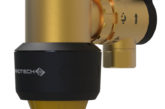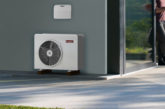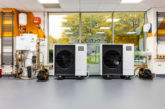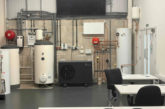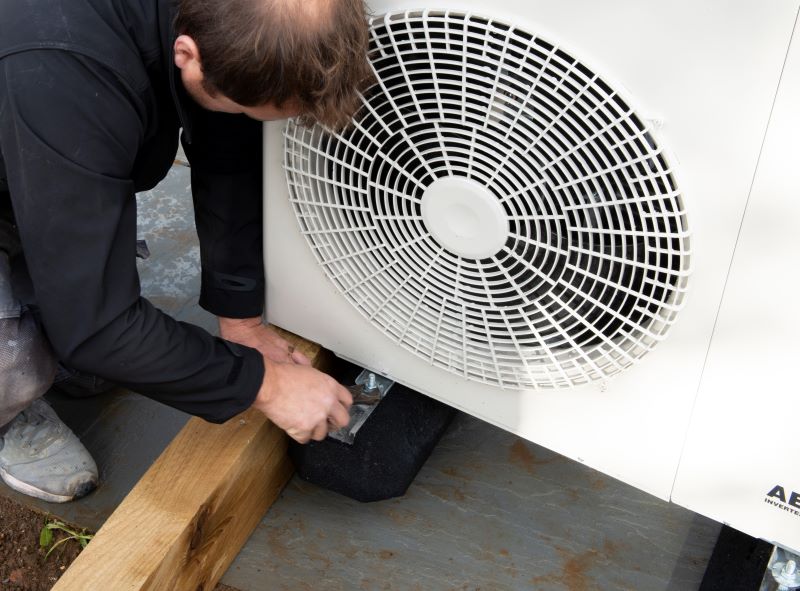
Phil Stanley, Training Manager at Grant UK, explains how hands-on, funded training is helping installers service and maintain heat pumps.
Much like traditional fossil fuel boilers, when it comes to servicing heat pumps, regular maintenance provides customers with added assurance and peace of mind, knowing their heat pump system is consistently performing at its peak.
Achieving maximum heat pump efficiency is about good system design, correct installation, precise setup, and regular servicing and proactive maintenance checks. Regular preventative maintenance not only safeguards the longevity of an air source heat pump, but also guarantees good performance and reliability, year after year. In today’s sustainable climate, a heating engineer that knows how to service a heat pump will be a popular one.
Servicing
A standard heat pump service encompasses the following key steps:
– Visual checks of the heat pump and core components to identify any obstructions and to assess their condition
– Clean the heat pump evaporator
– Check the wider heating system including the expansion vessel, system pressure, concentration levels of the anti-freeze/corrosion protection, check the controls settings and look for any leaks on the system.
During a service, engineers must know how to perform a thorough check on the heat pump. This includes visually inspecting the unit to ensure it is in good condition, clearing any blockages in the condensate drain opening at the base, examining the condition of flexible hoses, isolating valves and connection points, assessing the state of all pipe insulation and verifying that remote controller settings are correctly configured. Additionally, it is crucial to remove any obstructions to the airflow through the unit such as a build-up of leaves or anything stacked against the heat pump. Also, it is essential to clean the heat pump’s evaporator fins with a soft brush to maintain optimal airflow. The evaporator should also be washed with a neutral cleaner using a low-pressure spray, such as a garden sprayer, to ensure peak performance. Never use a pressure washer to clean the evaporator as it may damage the fins.
Engineers should also inspect for potential refrigerant leaks. Evidence such as oil residue on the refrigerant circuit could indicate a leak, which should be promptly addressed. Leaks can hinder the heat pump’s efficiency, impacting its performance. Under no circumstances should the refrigerant be vented from the charging points on the refrigerant circuit of the heat pump. Any necessary work on the refrigerant circuit must be exclusively handled by an F-Gas Registered Engineer.
Alongside inspecting the refrigerant circuit for potential leaks, engineers should conduct a comprehensive examination of the heating and hot water system. This should include verifying the expansion vessel pressures and repressurizing if necessary, assessing the pressure relief valves’ operation, cleaning the magnetic filter, examining the heating system pressure and replenishing if needed, checking the heating and hot water control settings, thoroughly inspecting electrical connections and PCB for any signs of scorching or damaged cables, and ensuring the correct concentration and condition of the inhibitor/anti-freeze protection within the system.
Boiler Upgrade Scheme
The recent 50% increase of the Boiler Upgrade Scheme for air source heat pumps means homeowners can now secure a £7,500 grant for an air source heat pump installation when they replace their old gas or oil boiler. It opens the door for more households to move to a renewable heating system and, for heating engineers, it means the opportunity to upskill and enhance their businesses is very much alive with more demand for new air source heat pump installations and the subsequent servicing requirements. The great news is that there are grants available for eligible installers who want to expand their knowledge.
Training
The Heat Training Grant is a funding scheme for heating engineers set up by the UK Government’s Department for Energy Security and Net Zero. Through this scheme, registered training providers, such as the Grant UK Training Academy in Swindon, can access up to £500 of funding to cover the cost of one heat pump installation course per eligible installer.
Grant UK’s Training Academy is offering funded spaces on the OFTEC OFT21-504A – ASHP Installation, Commissioning, and Servicing of Air Source Heat Pumps qualification course. The course fee for this qualification is covered by the Heat Training Grant funding so the course will be free of charge to the installer, subject to the individual meeting the scheme’s eligibility requirements. This OFT21-504 Installer qualification is one of several recognised by MCS for those seeking to achieve MCS Certification as an Air Source Heat Pump Installer in compliance with MIS 3005-I.
During this two day course, installers will not only learn how to service a heat pump correctly but will cover a wide range of other essential topics including the different types of heat pump, their construction and main components, principles of operation, hot water cylinders, buffer tanks and low loss headers for heat pumps, heat emitter types, system water treatment, electrical wiring, controller settings, installation considerations and requirements and commissioning the complete system. There is also the opportunity for engineers to gain hands-on experience working with the range of Aerona³ air source heat pumps. Successful completion of the written assessment at the end of this course is a prerequisite for candidates intending to apply to join the Grant UK G1 Installer Scheme.
For further information about air source heat pump servicing, either on the Aerona³ heat pump product training course or on the OFTEC OFT21-504A (Installation, commissioning and servicing of ASHPs) course, please click here.



